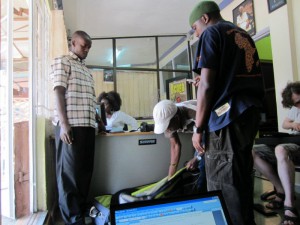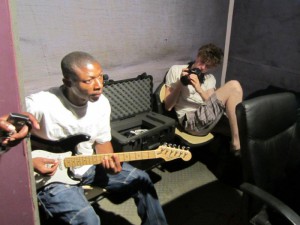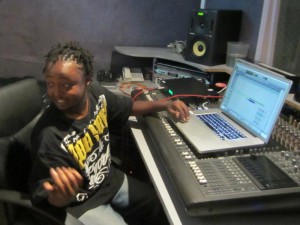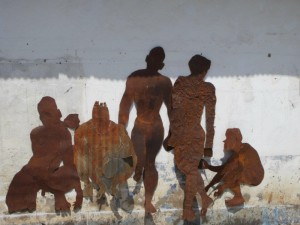We arrived last night in Nairobi. A flawless flight and passport control. The only hitch was actually leaving the car park which had one person taking money and doing various other things at the same time including chitchatting with passerbys. That took almost an hour.
Preparations at Ketebul Music studio
We came to Ketebul this morning to get ready for our trip tomorrow. Ketebul is buzzing with people getting everything packed up. Steve, project manager, was cracking the whip. Pato, head of Video, was quickly learning how to use the new lighting kit (SW 4), but he was constantly distracted by the new Singing Wells Flip Camera. Nick focused on learning the Clapperboard. And Willie joined Jimmy in the studio with Johnnie, the guitarist, to lay down some guitar tracks for the new fund raising song, Missing – Global Remix.
An interview with Tabu
The the midst of all the packing chaos, Hunter and I had a chance to talk to Tabu, the head of Ketebul and a music producer with 30 years experience.
The plan tomorrow is to travel up the Great Rift Valley to Kitale, about 400 km northwest of Nairobi. In Kitale we’ll record the Sabaot. The next day we will drive to Kapenguira to record the Pokot. After that we go to Eldoret then onto Iten and Kapsowar to record the Marakwet and Keiyo. The last day to go to L Baringo to record the Tugen. Tabu is not sure what to expect of the tribal music in the villages we are visiting but he is always surprised by the quality of music we discover with Singing Wells. “I didn’t really know what to expect of the Batwa of Uganda, and was blown away by the musicianship. I expect to be surprised again!”
The last time he was there was about 20 years ago. He thinks the music will be similar to music he has heard in Northern Kenya. He says he is always surprised by the quality of the voices and harmonies. “It’s as if they’ve been professionally trained.” The tribes are generally pastoralists so traditionally they move around quite a bit and will not have heavy, big instruments. They will only have instruments they can easily carry although it’s amazing the amount sound they can produce. ” We asked Tabu about the role of harmony in African music: ” Ethical harmonies are different from traditionally trained harmonies. When the missionaries came to East Africa they changed the ways people sang to fit with the traditional Western hymns. The children learn to sing from their elders and naturally join in when others are singing. There isn’t any formal training in tribal music. It is mother to child.”
Tabu goes on to describe the role of tribal music,” Their music is a ‘way of life’. They use music for communication, passing on information and entertainment. Music is always present when there is a birth, a death, a wedding or other ceremony. Each tribe will have unique stories to tell of their history, of war, of famine etc but there will be common themes as all Africans have similar challenges and experiences.”
Ketebul is recording traditional East African music before it is lost forever. Tabu came up with the idea of ‘going to the tribes’ rather than dragging the tribes to studios” He describes the Singing Wells approach to mobile recording: “Recording the tribes in their home villages is very different than recording them in the studio. In the villages the people are confident. They have their families and friends there who they feel comfortable and proud to perform in front of. Studios don’t exist near these villages so they would have to come to Nairobi to be recorded. Only the people who can afford to travel to Nairobi come so we miss all the talent in the villages. Also if we bring the villagers to the studio they are nervous and not as confident as they are at home. Once we’ve recorded them in the field then if we decide to bring them to Nairobi to our studio they are much more comfortable because they already know us. We did this last year with the Batwa – bringing them from Kisoro, through Kampala to Nairboi by bus to spend the weekend recording. They created amazing music and had the time of their lives.”
Tabu puts a lot of effort into finding the true traditional music. He feels politics and tourism have affected the music we usually hear from the tribes. He wants to hear how they really are at their most natural, where their roots are. Sometimes it is difficult to convince the tribes that this is what we really want to hear. The tribes often think we want to hear gospel, rap or songs performed for tourists. He wants to archive the traditional music because otherwise it will be lost. Young Kenyans in the cities are ignorant of the traditional music and are surprised when they hear quality and uniqueness of the tribal music.
In addition to archiving the music, Tabu feels Ketebul’s role is to make the music widely accessible and to empower the tribes. If the tribes’ music becomes better known then they will be invited to play in festivals and concerts around the nation. They’ll gain financially from this and be able to support the music. “They may even become world stars!” He cited Tiny Moses from Kisoro, saying that he could play anywhere. He also works with the fusion of traditional and more modern music.
He works with young musicians in Nairobi to combine their music with the tribal music. The Rift Valley is known for its marathon runners. Most of the Kenyan stars have come from this area of Kenya. On this trip we willl visit villages where the Olympic medal winners in Beijing are from and record their music.
Ketebul is part of the Go Down Art Centre in Nairobi. This centre is funded by NGO’s and in particular the Ford Foundation. It hosts various artists including painters, sculptors, musicians and a film and TV production company. It attempts to keep art alive and well in the community and in particular in the youth of Nairobi. At the Art Centre we went to a photograph exhibition of “Nairobi Burning” during the 2007 riots. There were some poignant photos of the slums burning and people being beaten and killed. The unrest mainly affected the poor areas of Nairobi. One of the artists, Uncle Subu, from the Art Centre took corrugated iron from the slums after they burned and has made life size cut outs of people in various happy and natural poses. He wants to be sure we are reminded of this terrible time so it won’t happen again.
After a busy day of packing, meeting the whole team and getting organised we headed back to the hotel to get a good night’s sleep before tomorrow’s long drive North.
Kathy Allen
Trustee, Abubilla Music Foundation




